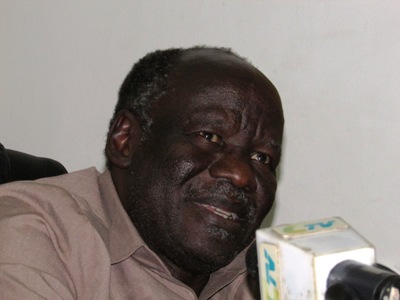SPLM is not South Sudan, says DC leader
March 20, 2016 (JUBA) – Lam Akol, leader of the main unarmed opposition party in South Sudan, the Democratic Change (DC), has said the ruling party in the country, the Sudan People’s Liberation Movement (SPLM), led by President Salva Kiir, is not South Sudan and should be replaced.

“If the SPLM collapses, there will be no state call South Sudan, only parties such as SPLM-Bahr el Ghazal, SPLM-Nuer, SPLM-Equatoria, and so on…or unpatriotic parties,” Agoot told Al Maugif newspaper.
The DC leader, whose party broke away from the SPLM but had to recently change its name from SPLM-DC to DC, said the comment equating SPLM to South Sudan was exaggerated and a weak argument which he described as “self-deception.”
“The State of South Sudan is its people and these people existed before the SPLM and will continue to exist after its demise as is expected by many who suffered in its hands,” said Akol in an article published on Friday.
“Those who tie the end of the South Sudan with the demise of the SPLM are those who are unwilling to face the current reality and take the requisite difficult decisions. While they acknowledge that the SPLM has lost direction, deviated from the course of the struggle, abandoned its slogans and did not provide for the people even a semblance of services and development since taking charge of South Sudan since 2005, they completely fail to recognize that such a failure which culminated in a devastating civil war requires a surgical operation that may lead to the amputation of some parts of the body that are affected by the cancer,” he said.
He suggested that there was need for a move in order to remedy the failure of SPLM as a party which he said requires, among other things, readiness to form an alternative party that would restore the dreams of the masses in the revolutionary slogans and the defence of democracy and human rights, which he said the SPLM has abandoned as a political party and in government.
“The SPLM is principles and ideas, programmes and plans, organization and organs. If these are abandoned, what does the name stand for?” he inquired.
Akol said the current SPLM’s many factions are simply fighting over the name as a historical trademark, but not what the party could do for the welfare of the nation. He dismissed being historical as a genuine reason to maintain it, saying even Any-nya, Southern Front and South Sudan Liberation Movement which started liberation struggles in Sothern Sudan were historical names.
He further argued that other countries which fought longer years of liberation struggle had also changed their historical names and transformed into new parties to address their contemporaries.
“Going beyond our borders, the Eritreans have struggled under the umbrella of the Eritrean People’s Liberation Front (EPLF) for a number of years not less than the period during which the people of South Sudan struggled under the leadership of the SPLM.
However, after the independence of Eritrea the name of the front, that led the armed struggle, was changed to the People’s Front for Democracy and Justice. This action did not take away anything from the impressive record of the EPLF,” Akol stressed.
Akol, a former foreign minister of Sudan before South Sudan split and established independence in 2011, said what mattered were the principles, objectives or program of a party, and not the name.
He criticized the SPLM for failing to uphold to its vision and direction and therefore the need to look for an inclusive people-driven political party which will ensure peace and stability, democracy, freedoms and development in catering for the masses in the world’s youngest nation.
Majak de Agoot, a former deputy minister for defence in South Sudan, earlier argued that it will be impossible to establish an alternative national political party to replace the SPLM, adding that populations will be divided on tribal-based party lines in the event that the SPLM collapses.
Agoot also criticized President Kiir’s “regime” for being anti-democracy, adding that it has been hijacked by the Jieng [Dinka] Council of Elders (JCE), a group of self-appointed but state-sanctioned intellectuals and politicians selected from various clans of the Dinka ethnic group where the President hails.
“What dominates the political scene currently is the Jieng Council of Elders (JCE) and equivalent synonyms and antonyms,” Agoot said.
Agoot, a senior military officer turned politician, was one of 13 SPLM leaders who got detained after the 15 December 2013 violent conflict resulting from internal debates on reforms within the ruling party.
Initially he and his other colleagues joined former vice president, Riek Machar, who doubled as first deputy chairperson in the party to complain against President Kiir’s “dictatorial tendencies” and held a press conference on 6 December 2013, 9 days before the violence.
“We were persecuted by the regime and our lives were at risk just because we had spoken about reforms and democracy. We were exiled but we did not give up the fight. We did not free-ride on anybody’s struggle,” he said.
The group, later known as former detainees (FDs) after their release, decided not to associate themselves with the armed struggle and tended to stay almost neutral but part-time per consent of the two warring parties during the peace process in Addis Ababa.
Akol on the other hand was barred by President Kiir’s government from leaving Juba and participating in the peace talks in the Ethiopian capital.
(ST)
